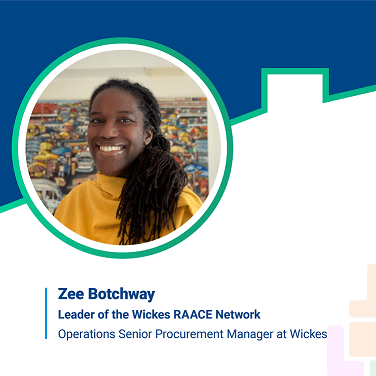
Zee has been at Wickes for over 15 years and has held many different roles in that time, Deputy Store Manager to Senior Procurement Management at our Support Centre. Since 2018 Zee has been leading our RAACE networks alongside her day job, a role that she finds both challenging and rewarding.
As we head into Black History Month, we sat down with Zee to hear more about what this role has meant over the past year and what they’re striving to change in the future.
Hey Zee! Thanks for sitting down with us today. Firstly, we’d love to hear a little more about the RAACE network.
We have two key areas of focus which we refer to as workstreams for the network. They are the Cultural Calendar and Driving change.
The Cultural Calendar workstream is activity we take to celebrate the different cultures and religious events within Wickes and where we break the boundaries on awkward conversations in particular on race. Our ethos for cultural calendar activities is to eat, educate and celebrate. Over the last few years we found different ways to achieve this not just by sharing food but in sharing recipes, meal ideas and traditions with the wider community. The Cultural Calendar also includes our three major events which are the International Film Festival, South Asian Heritage Month and Black History Month. Through these iconic events we have been able to help colleagues on their journey to allyship to understand how they can support and include marginal Communities within the Wickes family and how to deal with difficult situations.
Driving change is the activity that actively drives change behind the scenes. It is the engine room of the network because the activities taken such as policy changing, internal and external training programmes, allyship programmes and mentorship programs that are created and or driven through this workstream have the biggest effect on achieving our overall mission, which is to have Diversity at all levels at Wickes.
You mentioned the allyship programme, we’d love to hear a bit more about that and what your role has been?
We recognise the importance for allyship and that the ethnically diverse community can not drive true change on our own, we need our allies so the network and I pulled together the key topics that we felt should be covered in our allyship programme, some of those topics include; Privilege, intersectionality and Microaggressions. We then worked with Business in the Community to ensure your Ally programme met the Race to Work Charter standards and had industry leading content.
It was important to us that the session had breakouts for people to explore the content, have time to discuss it and that we have conversation hints and tips and a clear action guide. So often people go on ally programmes, learn about topics but leave unsure of how to actively be an ally and we didn’t want that for our programme.
We’ve got some fabulous allyship programmes for our Pride and Balance for Better networks so we took some learnings from them and some of the tools will be universal so hopefully it will strengthen the knowledge and confidence of all our allies. It also recognised intersectionality in that If you're disabled, female, black, and you're in the LGBTQ+ community, there are several layers of things that may be affecting your progression, or the relationships you have with your manager or the business overall. So it’s not just about race.
When it comes to things like microaggressions, we need to help colleagues understand the difference between what is commonly masked as banter and what is actually a microaggression, such as a joke about somebody's limp, the person saying the joke might think it's funny, but if the person who has the limp has an underlying health condition and they will always have that limp, that’s not funny. It becomes wearing. We need to empower everyone to recognise this and pull the joke maker up because It's about recognising that microaggressions affect people.
There's many layers to this, and we want to try and affect as many of those layers as possible. And if we're saying we're changing it, we need to actually change it.
It’d be great if everyone had the confidence to speak up like you have against these microaggressions. What is it about the Wickes culture that gives you the confidence to do so?
I didn’t start off with that confidence and these conversations often aren't easy. Even when I was approached about starting the RAACE network In 2018 I found myself whispering to my colleagues about the topics we were looking into and working on, but then I remember thinking ‘why are you whispering?’ Over time, I’ve gotten more comfortable and I know the business really wants to make Wickes a place where everyone can feel at home.
When the RAACE network gets together we have the most brilliant conversations. There’d be someone who was Indian, Pakistani, Sri Lankan, Jamaican, Nigerian or from Ghana heritage. These conversations about race and experiences were almost like a mini community that had always been there, but never been together. I think that started to drive more confidence. We decided to share these conversations and experiences more broadly and for South Asian Heritage Month and Black History Month we often share Blogs which are a chance for everyone to see and feel a part of these conversations.
Also in the last 4 years we have seen some radical change in our senior leadership team as a result of the work our network has done. We have Senior Black and Ethnically diverse leaders. It is so important to see people higher up who look like me and the other colleagues who are on the RAACE network.
I love that you've grown alongside the network. Beyond what we’ve touched on, what makes Wickes a special place to work?
Wickes has a culture, but I can't quite necessarily put a pin in what it is, or sum it up.
You go to meetings, and there will be quite a few people who say they've been there more than 5 years. And I've always thought if you don't enjoy it, you're not really going to be hanging around for more than 5 years. Of course it’s good to have a refresh and new people coming in, but a lot of people do have a good innings here, and it’s the culture that drives that.
The culture at Wickes has an underlying current of goodness that people just love.
Finally, do you feel at home at Wickes?
I don't know that you could be somewhere for 15 years and not feel at home!






